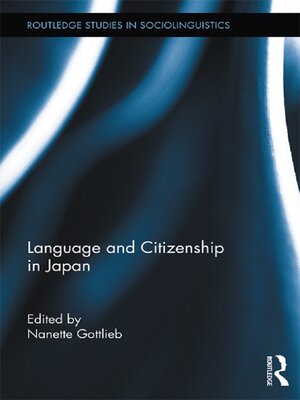
Sign up to save your library
With an OverDrive account, you can save your favorite libraries for at-a-glance information about availability. Find out more about OverDrive accounts.
Find this title in Libby, the library reading app by OverDrive.



Search for a digital library with this title
Title found at these libraries:
| Library Name | Distance |
|---|---|
| Loading... |
The relationship between language and citizenship in Japan has traditionally been regarded as a fixed tripartite: 'Japanese citizenship' means 'Japanese ethnicity,' which in turn means 'Japanese as one's first language.' Historically, most non-Japanese who have chosen to take out citizenship have been members of the 'oldcomer' Chinese and Korean communities, born and raised in Japan. But this is changing: the last three decades have seen an influx of 'newcomer' economic migrants from a wide range of countries, many of whom choose to stay. The likelihood that they will apply for citizenship, to access the benefits it confers, means that citizenship and ethnicity can no longer be assumed to be synonyms in Japan.
This is an important change for national discourse on cohesive communities. This book's chapters discuss discourses, educational practices, and local linguistic practices which call into question the accepted view of the language-citizenship nexus in lived contexts of both existing Japanese citizens and potential future citizens. Through an examination of key themes relating both to newcomers and to an older group of citizens whose language practices have been shaped by historical forces, these essays highlight the fluid relationship of language and citizenship in the Japanese context.







